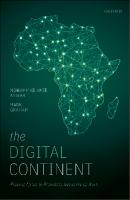The Digital Continent
Placing Africa in Planetary Networks of Work
Author(s)
Anwar, Mohammad Amir
Graham, Mark
Language
EnglishAbstract
Only ten years ago, there were more internet users in countries like France or Germany than in all of Africa put together. But much has changed in a decade. The year 2018 marks the first year in human history in which a majority of the world’s population are now connected to the internet. This mass connectivity means that we have an internet that no longer connects only the world’s wealthy. Workers from Lagos to Johannesburg to Nairobi and everywhere in between can now apply for and carry out jobs coming from clients who themselves can be located anywhere in the world. Digital outsourcing firms can now also set up operations in the most unlikely of places in order to tap into hitherto disconnected labour forces. With CEOs in the Global North proclaiming that ‘location is a thing of the past’ (Upwork, 2018), and governments and civil society in Africa promising to create millions of jobs on the continent, the book asks what this ‘new world of digital work’ means to the lives of African workers. It draws from a year-long fieldwork in South Africa, Kenya, Nigeria, Ghana, and Uganda, with over 200 interviews with participants including gig workers, call and contact centre workers, self-employed freelancers, small-business owners, government officials, labour union officials, and industry experts. Focusing on both platform-based remote work and call and contact centre work, the book examines the job quality implications of digital work for the lives and livelihoods of African workers.
Keywords
gig economy, outsourcing, digital work, labour, job quality, precarity, flexibility, labour agency, AfricaDOI
10.1093/oso/9780198840800.001.0001ISBN
9780198840800Publisher
Oxford University PressPublisher website
https://global.oup.com/Publication date and place
Oxford, 2022Classification
Development economics and emerging economies
International economics
Economic geography
Africa


 Download
Download Web Shop
Web Shop